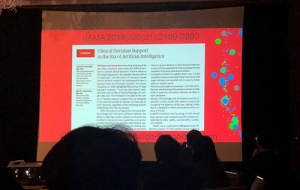AIMed19 Conference
 Old Members’ Trust Graduate Conference and Academic Travel Fund Report – Vidal M Arroyo (MSc by Research in Statistics Candidate)
Old Members’ Trust Graduate Conference and Academic Travel Fund Report – Vidal M Arroyo (MSc by Research in Statistics Candidate)
I had an amazing time attending the AIMed19 Conference in Laguna Niguel, California, which (to my delight!) was hosted at the Ritz Carlton Hotel located aptly on Laguna Beach. The 3-day conference gave me the opportunity to further explore how machine-learning and artificial intelligence (AI) will continue to shape clinical medicine. The conference, which is one of the few clinically-focused AI conferences in the world, had a plethora of amazing speakers from a diverse range of backgrounds.
On the first day of the conference, I attended a workshop that was focused on how cognitive computing is in some ways similar and other ways different from how physicians think. The workshop reiterated the fact that AI can never really replace a physician completely, but it can be used to augment a physician’s existing capabilities – which could lead to improved healthcare outcomes. In the opening session, the main speaker left us with one clear message: in data science, we analyze data – but in medicine, that data can be describing some of the most sensitive and painful experiences in one’s life. Thus, it is essential that we are sensitive to that.
Throughout the day, I heard an amazing set of talks covering a wide range of topics including how AI can be used to innovate in healthcare, how AI should and could be taught in medical schools, and even about how transfer learning can be used to enable automated diagnosis of autism. The talk on transfer learning was incredibly refreshing to see because this was what my talk was on. Later that day, I gave my talk on how transfer learning could be used to reduce rare disease disparities with the implementation of AI. The talk was incredibly well-received, and after I was able to talk with the speaker who also gave a talk on transfer-learning! All in all, it was an amazing opportunity to network and learn.
Over the last two days, I attended over 20 different talks, ranging from the regulation of AI in medicine to how AI can be used in cancer care. I even attended a Shark Tank competition from entrepreneurs who were seeking funding for their start-ups! I was also able to talk one-on-one with Dr Ted Shortcliffe, who is one of the pioneers of the use of AI in medicine and also a world-renowned physician-scientist. Talking to him definitely confirmed my desire to become a physician-scientist and merge my interests in experimental biology, computational biology, and clinical medicine to improve the human condition. Finally, I finished the conference in a truly Californian fashion, eating a delicious burrito on the sands of Salt Creek Beach. To end, I am incredibly grateful for the support of the Rhodes Trust Warden’s Discretionary Fund and the Old Member’s Trust Graduate Travel Fund from University College, Oxford. The funds from these two sources enabled me to broaden my academic horizon, make meaningful professional connections, and draw inspiration from a vibrant pool of young, passionate clinicians who want to transform the field of medicine.
Find out more about the range of travel grants and scholarships available to assist Univ students on our Travel Grants page or read further travel reports.
Published: 14 January 2020
Explore Univ on social media
